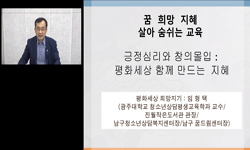AI(Appreciative Inquiry: 긍정적 탐색)는 긍정 심리학에 기반을 두고 제안된 것으로, 사람과 조직, 이들을 둘러싼 환경 내에 존재하는 긍정적인 요소들을 찾아 이를 발전시킴으로서 개인과 조직을 ...
http://chineseinput.net/에서 pinyin(병음)방식으로 중국어를 변환할 수 있습니다.
변환된 중국어를 복사하여 사용하시면 됩니다.
- 中文 을 입력하시려면 zhongwen을 입력하시고 space를누르시면됩니다.
- 北京 을 입력하시려면 beijing을 입력하시고 space를 누르시면 됩니다.

초·중·고등학생을 위한 AI(Appreciative Inquiry) 프로그램 개발 및 운영 지침 개발 연구 = The Study on Development of Appreciative Inquiry Programs and Guidebooks for adolescents
한글로보기https://www.riss.kr/link?id=A105066060
- 저자
- 발행기관
- 학술지명
- 권호사항
-
발행연도
2014
-
작성언어
-
-
주제어
긍정적 탐구 ; 긍정 ; 긍정주제 ; 초・ ; 중・ ; 고등학생 ; 청소년 Appreciative Inquiry ; AI ; positive core ; adolescents
-
KDC
373
-
등재정보
KCI등재
-
자료형태
학술저널
-
수록면
119-148(30쪽)
- 제공처
-
0
상세조회 -
0
다운로드
부가정보
국문 초록 (Abstract)
AI(Appreciative Inquiry: 긍정적 탐색)는 긍정 심리학에 기반을 두고 제안된 것으로, 사람과 조직, 이들을 둘러싼 환경 내에 존재하는 긍정적인 요소들을 찾아 이를 발전시킴으로서 개인과 조직을 발전시키는 개인과 조직개발의 원리이자 방법론
이다. 본 연구는 초·중·고등학생을 위한 AI 프로그램과 프로그램을 운영할 교사를 위한 운영 지침을 개발하는 것이다. 이러한 목적을 달성하기 위해 본 연구는 현장의 요구 조사, 프로그램 개발, 개발된 프로그램의 실행 및 형성평가를 통한 보완,
교사를 위한 프로그램 운영지침 개발의 과정으로 연구를 수행하였다. 연구결과를 정리하면 다음과 같다. 첫째, 초・중・고등학생들 대상 AI 프로그램의 주제 및 방향이 될 수 있는 긍정 주제들은 꿈, 리더십, 목표의식, 바른 인성, 배려, 대인관계,
자존감, 좋은 친구, 좋은 수업, 좋은 성적, 자유 시간 등이었다. 둘째, 목표수립 및 실천능력에 초점을 맞추어 프로그램을 운영할 때는 목표, 몰입, 성실, 자신감을 긍정주제로 활용하였다. 셋째, 즐거운 학급 만들기에 초점을 맞추어 프로그램을 운영
할 때는 서로 존중하기, 긍정적 마인드 갖기, 서로 배려하기, 다함께 진하게 지내기가 긍정주제로 활용되었다. 넷째, AI 프로그램을 개발, 운영할 때는 가능한 학생들이 긍정단어를 스스로 도출할 수 있는 기회와 실천 계획을 실천한 후 성찰할 수
있는 기회를 주는 것이 바람직하다. 다섯째, 프로그램의 원활한 운영을 위해서는 명목집단법을 활용하여 도출된 내용을 모두 쉽게 공유하고 정리할 수 있도록 하는 것이 바람직하다. 초·중·고등학생을 위한 AI 프로그램은 학생들의 학교적응, 진로개
발 등의 프로그램으로 활용할 수 있으며, 긍정적이고 성공적인 경험을 찾고 공유하는 가운데 긍정적인 학교문화를 만들 수 있을 것이다.
다국어 초록 (Multilingual Abstract)
Appreciative Inquiry(AI) is a method for studying and changing social systems(groups, organizations, communities) that advocates collective inquiry into the best of what is in order to imagine what could be, followed by collective design of a desired ...
Appreciative Inquiry(AI) is a method for studying and changing social systems(groups, organizations, communities) that advocates collective inquiry into the best of what is in order to imagine what could be, followed by collective design of a desired future state that is compelling and thus, does not require the use of incentives, coercion
or persuasion for planned change to occur. The Purpose of this study is to develop the Appreciative Inquiry program for elementary, middle and high school students and the operating procedures for the teacher to operate the program. In order to achieve this objective, this study analyzed the needs of the field, program development,
formative evaluation of a program, and program guidelines development. The results of the study are as follows. First, Positive core words for adolescents are dream, leadership, goal awareness, good character, care, interpersonal relationships, self-esteem, good friends, and good teaching. We can use these words for themes or
directions of AI program. Second, it is possible to utilize the positive words such as goal, flow, integrity, and confidence on workshop for goal setting. Third, in program for happy class, we can use positive cores such as Caring each other, respecting each other, having a positive mind-set, and uniting friendly stay. Fourth, It is desirable
that students themselves select positive core about theme in AI program. Fifth, it is desirable to visualize discussed contents using the nominal group technique. AI programs for adolescents can have the following meanings. First, it is possible to utilize the program for school adjustment and career development. Second, AI program may
be a method of data collection for consultation and group counseling because we can hear a lot of story of students. Third, it is possible to create a positive school culture based positive and successful experiences and stories.
동일학술지(권/호) 다른 논문
-
팀기반 학습에서 평가대상과 평가주체가 학습자의 수업흥미도와 학업성취도에 미치는 영향
- 학습자중심교과교육학회
- 김민정(Kim, Minjeong)
- 2014
- KCI등재
-
예비교사의 반성적 저널에서 나타난 수업시연과정에서 경험한 어려움과 의미 분석
- 학습자중심교과교육학회
- 배성아(Bae, Sung Ah)
- 2014
- KCI등재
-
동료피드백에서의 면대면 논의 과정 분석: 교육계획안 작성 활동을 중심으로
- 학습자중심교과교육학회
- 성지훈(Sung, JiHoon)
- 2014
- KCI등재
-
- 학습자중심교과교육학회
- 정소연(Chung, SoYeon)
- 2014
- KCI등재




 KCI
KCI 스콜라
스콜라






